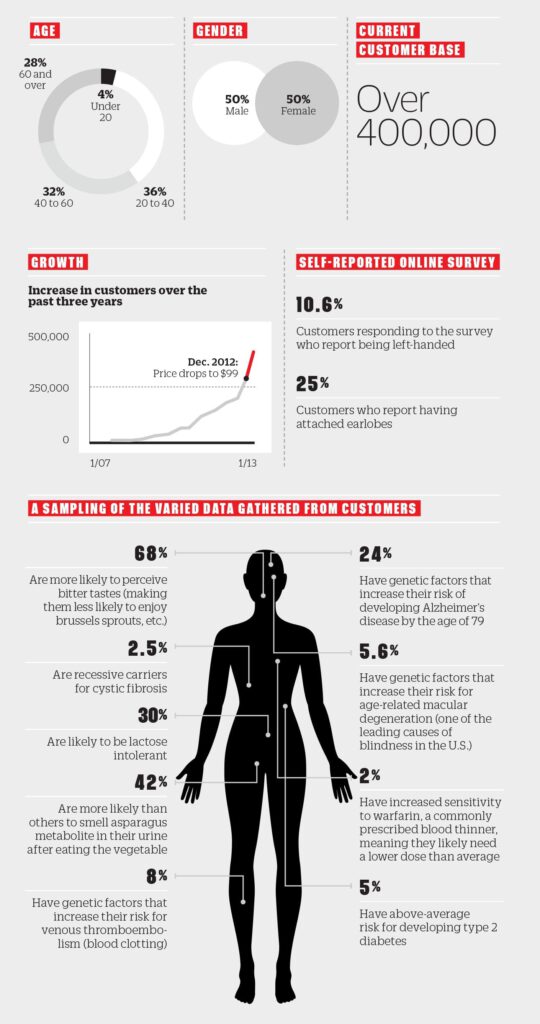Most 23andMe customers are interested in knowing what their genetics says about potential health risks.
They’re interested in exploring their own genetic information because knowing gives them the power to take action.

Here’s a graphic from the Fast Company article showing a snapshot of some of our customer data.
Knowing allows them to take preventative measures or prepare and mitigate for the things that can’t be changed. They also understand that an identified genetic risk for a condition isn’t the whole picture. Your genetics is important, but your health is influenced by many factors – your diet, whether you exercise, the amount of stress in your life along with what’s in your DNA. Knowing about a risk gives you the power to make changes to either prevent what you can or mitigate what you can’t.
But not everyone sees things in that way. Some people don’t want to know.
Among the many interesting angles in the recent Fast Company article about 23andMe and our CEO Anne Wojcicki, the story identified the challenge of marketing direct-to- consumer genetic testing to the right audience.
Ultimately we think that all individuals will find value in genetic testing, but for now many of our customers choose 23andMe because they want to know.
“Our marketing team’s job is to find people who aren’t afraid to manage their health, who aren’t afraid to know,” said Andy Page, 23andMe President.
It is interesting to look a little deeper at this notion of why some people want to know and some others don’t. If you talk to someone who has tested, they’re often baffled as to why someone wouldn’t want to know. Conversely, if you talk to someone who doesn’t want to get tested, he or she seem incredulous that anyone would want to find out they had a genetic risk for any disease. It’s actually a central paradox in the Fast Company article as the writer considers her next steps after learning that her young adopted daughter has a genetic risk for getting Alzheimer’s late in life.
What’s with the stark contrast between these two camps of people? A lot, apparently.
Recently, a study by researchers at the University of Florida looked specifically at why some people avoided learning about their health risks, even when knowing those risks might help prevent them from ever developing the disease.
The researchers learned that a person’s receptiveness to this kind of information has everything to do with how the information is presented and who is presenting it. In one group of individuals, the researchers found that people were more likely to opt-in to finding out about their risk for type 2 diabetes and cardiovascular disease if they were asked to talk about why they might not want to see the information. It also helped if they were given information about how they could reduce their risk, and whether or not
the condition was treatable.
And although some individuals said they would avoid finding out about a risk because they might be distressed by it, several studies indicate that people don’t experience inordinate stress. Learning of these risks can also trigger positive actions, like talking to a doctor and preventative treatment.
23andMe gives people the choice to take this information and inform how they manage their own health. We’ve included a short video from a PBS station in San Francisco asking people whether they’d want to know. Check it out.
A couple of producers for “On The Media” a show that airs regularly on NPR stations discuss the reasons they’ve decided to do 23andMe and then spit together. Have a listen.